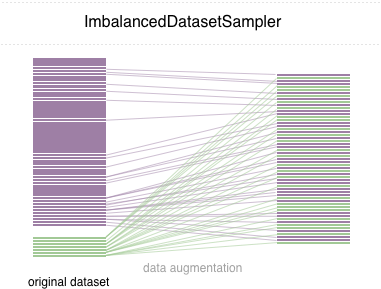Hi, I am using BERT for multi label classification.
The dataset is imbalance and I use ImbalancedDatasetSampler as the sampler.
(tensor([ 101, 112, 872, 4761, 6887, 1914, 840, 1914, 7353, 6818, 3300, 784,
720, 1408, 136, 1506, 1506, 3300, 4788, 2357, 5456, 119, 119, 119,
4696, 4638, 741, 677, 1091, 4638, 872, 1420, 1521, 119, 119, 119,
872, 2157, 6929, 1779, 4788, 2357, 3221, 686, 4518, 677, 3297, 1920,
4638, 4788, 2357, 117, 1506, 1506, 117, 7745, 872, 4638, 1568, 2124,
3221, 6432, 2225, 1217, 2861, 4478, 4105, 2357, 3221, 686, 4518, 677,
3297, 1920, 4638, 4105, 2357, 1568, 119, 119, 119, 1506, 1506, 1506,
112, 112, 4268, 4268, 117, 1961, 4638, 1928, 1355, 5456, 106, 2769,
812, 1920, 2812, 7370, 3488, 2094, 6963, 6206, 5436, 677, 3341, 2769,
4692, 1168, 3312, 1928, 5361, 7027, 3300, 1928, 1355, 119, 119, 119,
671, 2137, 3221, 8584, 809, 1184, 1931, 1168, 4638, 117, 872, 6432,
3221, 679, 3221, 136, 138, 4495, 4567, 140, 102, 0, 0, 0,
0, 0, 0, 0, 0, 0, 0, 0, 0, 0, 0, 0,
0, 0, 0, 0, 0, 0, 0, 0, 0, 0, 0, 0,
0, 0, 0, 0, 0, 0, 0, 0, 0, 0, 0, 0,
0, 0, 0, 0, 0, 0, 0, 0, 0, 0, 0, 0,
0, 0, 0, 0, 0, 0, 0, 0, 0, 0, 0, 0,
0, 0, 0, 0, 0, 0, 0, 0, 0, 0, 0, 0,
0, 0, 0, 0, 0, 0, 0, 0, 0, 0, 0, 0,
0, 0, 0, 0, 0, 0, 0, 0, 0, 0, 0, 0,
0, 0, 0, 0, 0, 0, 0, 0, 0, 0, 0, 0,
0, 0, 0, 0]),
tensor([1, 1, 1, 1, 1, 1, 1, 1, 1, 1, 1, 1, 1, 1, 1, 1, 1, 1, 1, 1, 1, 1, 1, 1,
1, 1, 1, 1, 1, 1, 1, 1, 1, 1, 1, 1, 1, 1, 1, 1, 1, 1, 1, 1, 1, 1, 1, 1,
1, 1, 1, 1, 1, 1, 1, 1, 1, 1, 1, 1, 1, 1, 1, 1, 1, 1, 1, 1, 1, 1, 1, 1,
1, 1, 1, 1, 1, 1, 1, 1, 1, 1, 1, 1, 1, 1, 1, 1, 1, 1, 1, 1, 1, 1, 1, 1,
1, 1, 1, 1, 1, 1, 1, 1, 1, 1, 1, 1, 1, 1, 1, 1, 1, 1, 1, 1, 1, 1, 1, 1,
1, 1, 1, 1, 1, 1, 1, 1, 1, 1, 1, 1, 1, 1, 1, 1, 1, 1, 1, 1, 1, 0, 0, 0,
0, 0, 0, 0, 0, 0, 0, 0, 0, 0, 0, 0, 0, 0, 0, 0, 0, 0, 0, 0, 0, 0, 0, 0,
0, 0, 0, 0, 0, 0, 0, 0, 0, 0, 0, 0, 0, 0, 0, 0, 0, 0, 0, 0, 0, 0, 0, 0,
0, 0, 0, 0, 0, 0, 0, 0, 0, 0, 0, 0, 0, 0, 0, 0, 0, 0, 0, 0, 0, 0, 0, 0,
0, 0, 0, 0, 0, 0, 0, 0, 0, 0, 0, 0, 0, 0, 0, 0, 0, 0, 0, 0, 0, 0, 0, 0,
0, 0, 0, 0, 0, 0, 0, 0, 0, 0, 0, 0, 0, 0, 0, 0]),
tensor(0))
ValueError Traceback (most recent call last)
File D:\ProgramData\Anaconda3\envs\pytorch\lib\site-packages\pandas\core\frame.py:3892, in DataFrame._ensure_valid_index(self, value)
3891 try:
-> 3892 value = Series(value)
3893 except (ValueError, NotImplementedError, TypeError) as err:
File D:\ProgramData\Anaconda3\envs\pytorch\lib\site-packages\pandas\core\series.py:451, in Series.init(self, data, index, dtype, name, copy, fastpath)
450 else:
--> 451 data = sanitize_array(data, index, dtype, copy)
453 manager = get_option("mode.data_manager")
File D:\ProgramData\Anaconda3\envs\pytorch\lib\site-packages\pandas\core\construction.py:601, in sanitize_array(data, index, dtype, copy, raise_cast_failure, allow_2d)
599 subarr = maybe_infer_to_datetimelike(subarr)
--> 601 subarr = _sanitize_ndim(subarr, data, dtype, index, allow_2d=allow_2d)
603 if isinstance(subarr, np.ndarray):
604 # at this point we should have dtype be None or subarr.dtype == dtype
File D:\ProgramData\Anaconda3\envs\pytorch\lib\site-packages\pandas\core\construction.py:652, in _sanitize_ndim(result, data, dtype, index, allow_2d)
651 return result
--> 652 raise ValueError("Data must be 1-dimensional")
653 if is_object_dtype(dtype) and isinstance(dtype, ExtensionDtype):
654 # i.e. PandasDtype("O")
ValueError Traceback (most recent call last)
Input In [49], in <cell line: 5>()
2 from torchsampler import ImbalancedDatasetSampler
4 batch_size=3
5 dataloader_train_o = DataLoader(
6 dataset_train,
----> 7 sampler=ImbalancedDatasetSampler(dataset_train),
8 batch_size=batch_size,
9 # **kwargs
10 )
12 dataloader_validation_o = DataLoader(
13 dataset_val,
14 sampler=SequentialSampler(dataset_val),
15 batch_size=batch_size,
16 # **kwargs
17 )
File D:\ProgramData\Anaconda3\envs\pytorch\lib\site-packages\torchsampler\imbalanced.py:37, in ImbalancedDatasetSampler.init(self, dataset, labels, indices, num_samples, callback_get_label)
35 # distribution of classes in the dataset
36 df = pd.DataFrame()
---> 37 df["label"] = self._get_labels(dataset) if labels is None else labels
38 df.index = self.indices
39 df = df.sort_index()
File D:\ProgramData\Anaconda3\envs\pytorch\lib\site-packages\pandas\core\frame.py:3655, in DataFrame.setitem(self, key, value)
3652 self._setitem_array([key], value)
3653 else:
3654 # set column
-> 3655 self._set_item(key, value)
File D:\ProgramData\Anaconda3\envs\pytorch\lib\site-packages\pandas\core\frame.py:3832, in DataFrame._set_item(self, key, value)
3822 def _set_item(self, key, value) -> None:
3823 """
3824 Add series to DataFrame in specified column.
3825
(...)
3830 ensure homogeneity.
3831 """
-> 3832 value = self._sanitize_column(value)
3834 if (
3835 key in self.columns
3836 and value.ndim == 1
3837 and not is_extension_array_dtype(value)
3838 ):
3839 # broadcast across multiple columns if necessary
3840 if not self.columns.is_unique or isinstance(self.columns, MultiIndex):
File D:\ProgramData\Anaconda3\envs\pytorch\lib\site-packages\pandas\core\frame.py:4528, in DataFrame._sanitize_column(self, value)
4515 def _sanitize_column(self, value) -> ArrayLike:
4516 """
4517 Ensures new columns (which go into the BlockManager as new blocks) are
4518 always copied and converted into an array.
(...)
4526 numpy.ndarray or ExtensionArray
4527 """
-> 4528 self._ensure_valid_index(value)
4530 # We should never get here with DataFrame value
4531 if isinstance(value, Series):
File D:\ProgramData\Anaconda3\envs\pytorch\lib\site-packages\pandas\core\frame.py:3894, in DataFrame._ensure_valid_index(self, value)
3892 value = Series(value)
3893 except (ValueError, NotImplementedError, TypeError) as err:
-> 3894 raise ValueError(
3895 "Cannot set a frame with no defined index "
3896 "and a value that cannot be converted to a Series"
3897 ) from err
3899 # GH31368 preserve name of index
3900 index_copy = value.index.copy()
ValueError: Cannot set a frame with no defined index and a value that cannot be converted to a Series



 (left: test acc in each epoch; right: confusion matrix)
(left: test acc in each epoch; right: confusion matrix)  (left: test acc in each epoch; right: confusion matrix)
(left: test acc in each epoch; right: confusion matrix) 

